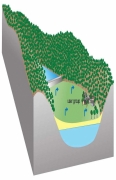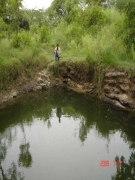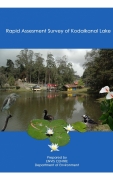/topics/lifestyle
Lifestyle
Community organisation in groundwater management – A presentation by ACWADAM
Posted on 27 Aug, 2010 04:01 PM This presentation by ACWADAM on community organization in groundwater management deals with the processes involved in people’s mobilization and participation. The requisites of groundwater management include: resource enhancement, demand management, equitable distribution, institutional mechanism and controlling of free riding. It deals with groundwater management at a local scale when compared to aquifer management.
This presentation by ACWADAM on community organization in groundwater management deals with the processes involved in people’s mobilization and participation. The requisites of groundwater management include: resource enhancement, demand management, equitable distribution, institutional mechanism and controlling of free riding. It deals with groundwater management at a local scale when compared to aquifer management.
Aquifer management involves:
- Identification of aquifer on the basis of geology;
- Identification of recharge and discharge areas;
- Assessment of aquifer capacity and yield through aquifer mapping;
- Protection of recharge area and increasing the groundwater level through artificial recharge in recharge area (based on the geology);
- Treating groundwater as a common property resource;
- Encouraging community use of groundwater and restricting individual use;
- Putting in place an institutional mechanism and legal back up for community groundwater management;
- Awareness generation regarding groundwater and science of hydrogeology.
Pani Panchayat: A model of groundwater management – A presentation by ACWADAM
Posted on 25 Aug, 2010 08:20 AM The presentation by ACWADAM deals with Pani Panchayats as a model of groundwater management.
The presentation by ACWADAM deals with Pani Panchayats as a model of groundwater management.
Pani Panchayat is the name first given to a movement by Mr. Vilasrao Salunke for motivating farmers of Naigaon village of the drought-prone Purandhar taluka of Maharashtra in 1974. The government's inability to deal with the drought situation prompted him to take a 40 acre land on lease from the village temple trust and develop a recharge pond in the recharge area of the village, a dug well in the discharge zone and a lift irrigation system.
Farmers got impressed with the results demanding a scale up of the experiment leading to the setting up of Gram Gaurav Pratisthan (GGP) through which the work was expanded to encompass both groundwater and surface water management.
Floods, drinking water contamination, mining and waterbodies, water bills, water conflicts - News roundup (1-7 August 2010)
Posted on 07 Aug, 2010 04:51 PMFloods: lessons to be learnt from the massive flooding in Surat city
A report by IIM criticises the way in which dams are managed in the country and calls for the need to apply Management Science / Operations Research techniques and information technology to improve dam management and prevention of floods
Duel among duals - Popular science of basaltic hydrogeology in a village of Saurashtra - A paper by CAREWATER
Posted on 03 Aug, 2010 07:57 PM The report by Carewater INREM Foundation deals with the duel between popular science used in decision making by farmers and the formal science of hydrogeology that is based on scientific data collection. These two parallel streams of knowledge exist together, sometimes complement, and at other times are at conflict. People’s knowledge on hydrology is not ‘dying’, but thriving and growing well, refreshed continually by interfaces with science. In hard rock areas, the high hydrogeologic variability makes observation as important as theory since it is localized, pervasive and relevant to the needs of people.
The report by Carewater INREM Foundation deals with the duel between popular science used in decision making by farmers and the formal science of hydrogeology that is based on scientific data collection. These two parallel streams of knowledge exist together, sometimes complement, and at other times are at conflict. People’s knowledge on hydrology is not ‘dying’, but thriving and growing well, refreshed continually by interfaces with science. In hard rock areas, the high hydrogeologic variability makes observation as important as theory since it is localized, pervasive and relevant to the needs of people.
Rapid assessment survey of Kodaikanal lake - ENVIS Centre (TN) (2009)
Posted on 02 Aug, 2010 02:02 AM This document by the Department of Environment, Government of Tamil Nadu highlights the importance of the Kodaikanal lake as an important tourist destination and warns that this freshwater lake is under the threat of getting polluted and its biodiversity endangered.
This document by the Department of Environment, Government of Tamil Nadu highlights the importance of the Kodaikanal lake as an important tourist destination and warns that this freshwater lake is under the threat of getting polluted and its biodiversity endangered.
The document presents the findings of the study that aimed at assessing the physico-chemical and biological quality of the Kodaikanal lake.
Evidence indicates that unrestricted tourism activities have led to high use of plastic bottles, glass bottles, plastic bags, causing high levels of pollution and silting of the lake. Damaged fibreglass boats left inside the lakes also pose a serious threat to the lake ecosystem.
Dr. G. D. Agrawal , the scientist, environmentalist and rishi
Posted on 27 Jul, 2010 03:52 PMDr. G. D. Agrawal Scientist and Rishi
Meeting Dr. G. D. Agrawal in his spartan, two room cottage in Chitrakoot, Madhya Pradesh, you would never guess what an accomplished and distinguished scientist he is – first Member-Secretary of the Government of India’s Central Pollution Control Board, former Head of the Department of Civil and Environmental Engineering at IIT Kanpur and a PhD from the University of California, Berkeley. The list goes on and on.
Yet this eminent professional sweeps his own floors, washes his own clothes and cooks his own meals. He retains only a few possessions and dresses in homespun khadi. At the age of 76, his main mode of transport within Chitrakoot is a bicycle and when he travels further afield, he goes by ordinary bus and second-class train. These are the deliberate choices of a devout Hindu whose deepest values are for simplicity and reverence for nature. Dr G.D. Agrawal is the doyen of environmental engineering professionals in India. Well past retirement, he continues to teach and inspire students as an Honorary Professor of Environmental Sciences at the Mahatma Gandhi Chitrakoot Gramodaya Vishwavidyalaya, in Chitrakoot (M.P.).
5th Global YES Summit, Rework The World - A trip report
Posted on 26 Jul, 2010 11:17 PMHad the opportunity to attend a recent worldwide gathering on the topic of youth and social entrepreneurship, which gave much food for thought. The event was the 5th Global YES Summit, entitled “ReWork The World”. Details of the gathering are at www.reworktheworld.org . The message there was that we need to do something radical in order to find productive work for the vast numbers of youth coming into the workforce especially in developing nations. The new jobs cannot be of the old variety, they need to be green, sustainable jobs. In other words, we need to ‘rework the world’. The conference was based on the premise that these new jobs will come out of social entrepreneurship.
Project Boond - V, a comprehensive mitigation initiative in the drought prone regions of Bharatpur
Posted on 21 Jul, 2010 01:47 PMWith the failure of monsoons in Rajasthan and dry-up of the Bilaspur dam, the water situation assumes graver proportions in most parts of Rajasthan, besides Jaipur, Tonk and adjacent districts. These areas, now in the news for acute water shortage problems, have always depended upon monsoons for their traditional rainwater-harvesting systems and the riverine sources.
While the Government has taken remedial measures with construction of tube-wells across the rural and drought-prone areas, they have been sporadic and insufficient at their best. Merely announcing relief measures and planning of schemes on paper as an immediate disaster management strategy are not solutions to mitigation of water problems in this State.
Prof G.D. Agrawal resumes fast unto death to save the Ganga, Swami Avimukteshwaranand and others to join in support
Posted on 21 Jul, 2010 11:10 AMForwarded to the Portal by: Ayan Biswas
Image and News Courtesy:
Shankracharya designate Swami Avimukteshwaranand ji presided over an emergency meeting organized by Manushi Sangathan, Ganga Ahvaan and Ganga Yamuna Jal Biradri to express our strong protest against the patently illegal decision of the Group of Ministers giving clearance to the Loharinag-Pala dam on the Ganga River. The following expert members of the NGRBA also participated in the meeting to express their strong protest having been kept in the dark about the appointment of the GoM which has passed a virtual death sentence on the most sacred river of India: Rashid Hyatt Siddiqui, Rajendra Singh, Rama Raota and Ravi Chopra.
Screenings/lectures/discussions - World Water Day 22nd/23rd March
Posted on 19 Mar, 2010 10:38 AM- New bill to penalize those wasting drinking water-Deccan Herald, Bangalore March 9
- Privatisation no solution to tackle water shortage in city- Deccan Herald March 9
- Water Crisis to worsen in city- Deccan Herald March 12
- City is the second highest water waster in country at 50.9% New Delhi top the list at 52.4%- Deccan Herald March 13
While all these questions remain unanswered and new ones add
The city gets thirstier under the scorching summer sun and the water vendors make fast buck in some instances as much as Rs 1000 for a tank load of water, a consortium of concerned organisations and institutions working on water and environment issues invite you to a panel discussion and film screenings on the use and abuse of water on March 22nd & 23rd 2010 at Ashirvad, 30 St. Mark Road Cross, Opp. State Bank of India at 5.45pm.





